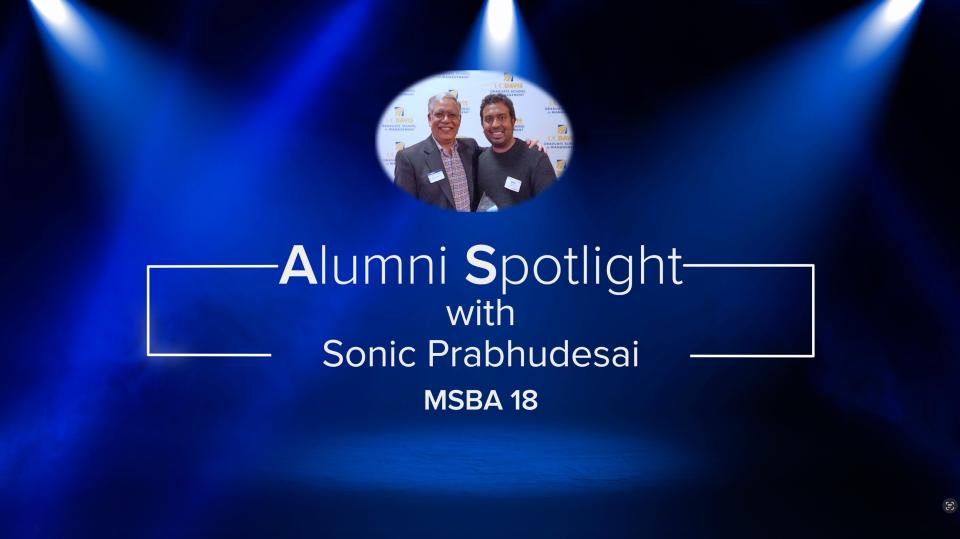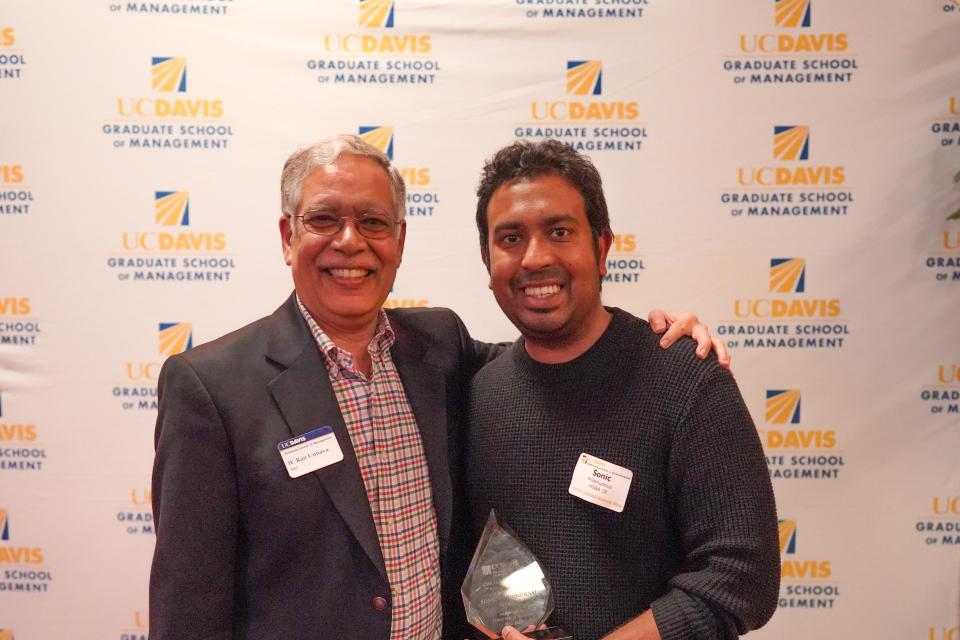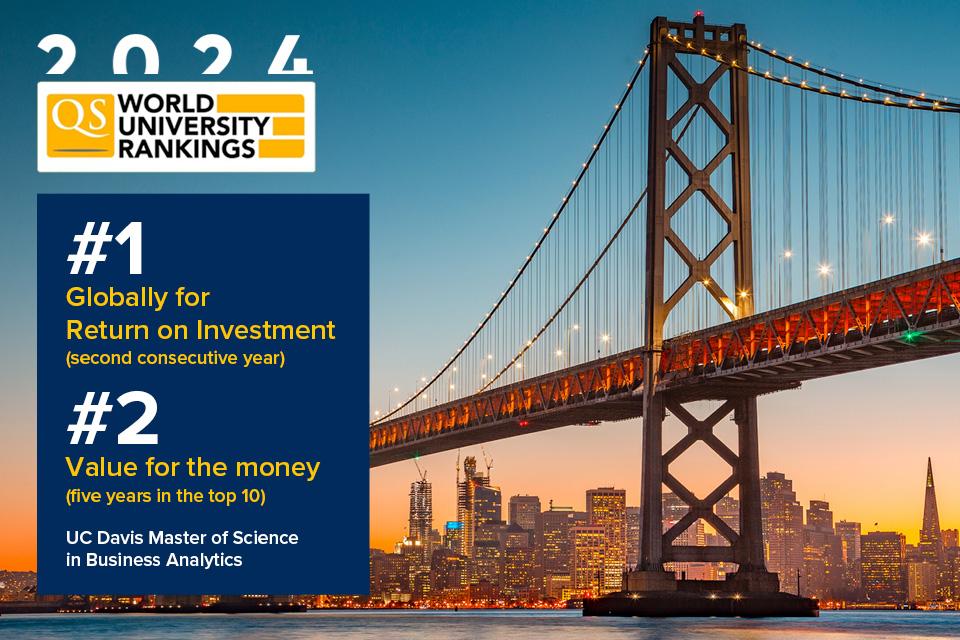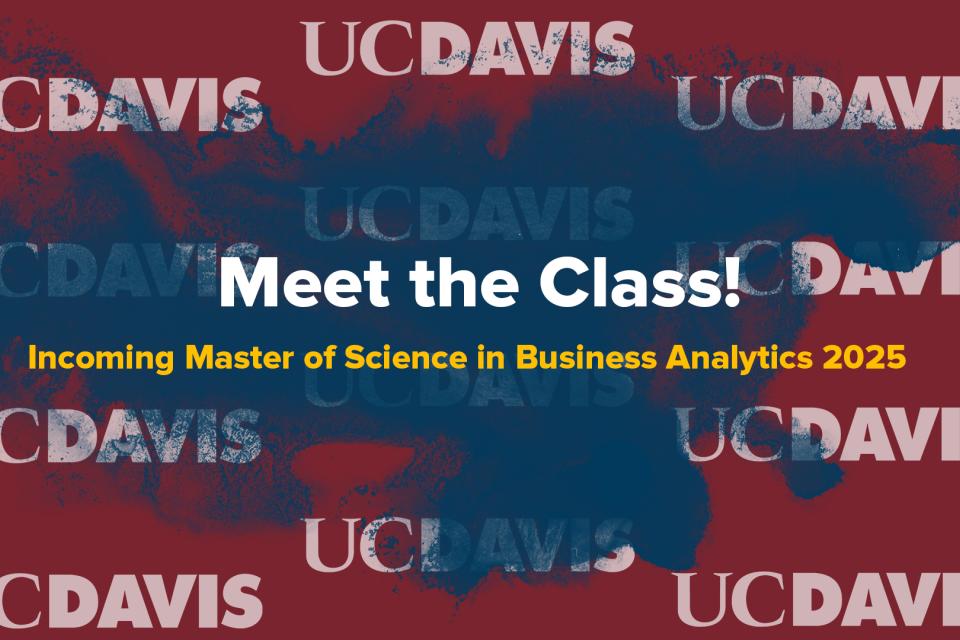Alumni Video Spotlight: Sonic Prabhudesai MSBA 18
Charles Schwab. Meta. And now, co-founder of somi.

When Sonic Prabhudesai MSBA 18 graduated from UC Davis, he did not just step into the world of analytics.
He dove headfirst into data at scale. At Charles Schwab, he worked on analytics for more than a trillion dollars in assets under management. A few years later, a leap to Meta opened doors to shape e-commerce growth playbooks across 100 countries and connect with the co-founder who would help him launch his own company.
Today, as co-founder of somi, a San Francisco startup reimagining how consumers use their data to personalize their world, Prabhudesai is once again pushing boundaries.
A GSM Alumni Association board director and recognized with the GSMAA Rising Star award in 2023, Prabhudesai shares how lessons in leadership, collaboration, and innovation from the UC Davis MSBA program shaped his mindset to embrace AI as an opportunity for progress, not a challenge.
Video Transcript
What are the highlights of your career the last few years?
When I graduated from the MSBA program in 2018, I got a shot to work at Charles Schwab, which is one of the largest brokerages in the world. I got a chance to work and do analytics for about a trillion and a half dollars of assets under management. The sheer impact that you can have when you're working at that scale is incredible.
About five years ago, someone took a bet on me and hired me at Facebook. I had the opportunity to really craft some of the biggest e-commerce growth playbooks, helping companies grow across 100 countries. Facebook is also where I met my co-founder. We took a bunch of our learnings from our time there to go out and start a company earlier this year.
We are going after a hard problem, which is really trying to question the status quo—what would it be to live in a world where every consumer can bring their data wherever they go and use that data to personalize the world and their experiences for them? That is what we are doing at somi, and it's been an incredible journey to really build a company from zero to one over the last few months.
What does collaborative leadership mean to you?
Collaborative leadership is essentially just recognizing that you don't know it all. It's a mechanism of bringing together people around you who make you better. The different and diverse perspectives really help you and enable you as a team and a collective unit to go after some of the hardest problems that you individually potentially couldn't have.
How do you collaborate at work to make an impact?
When you're looking at hard problems, you have to recognize that the only way you go after some of those hard problems and push the boundaries is when you have different perspectives from different people who are really looking at this one problem.
At work, you have to give yourself and your team the ability to be able to do that. It also means hiring the smartest people who at times are maybe much smarter than you are, and then giving them the ability to go after some of these problems as well. And that is how you really question the status quo and go after some of these difficult decisions.
What are the biggest challenges in your industry?
I think we are in one of the most important technological revolutions of a lifetime. The advent of AI could potentially be much bigger than what the internet was. And I wouldn’t consider this a challenge but almost reframe the thinking—this is an opportunity for every single person to really rethink how the world is and how the world will be over a longer period of time.
It's quite obvious that we are going to become far more productive. But in order for us to be able to do that, we have to push the boundaries on what we can do with that technology and almost embrace it and move at a pace much faster than we've done over the last ten years. So, it's really an opportunity rather than a challenge, but we need to get on the program.
What professor had the biggest impact on you?
I would shortchange the experience if I said it was just one professor that really had an impact on me. I think the complete faculty is really built around making you a better version of yourself.
Whether it was Professor Mehul, who really helped me think about statistics in a different way, or Andy Barkett, who really made me come out of my shell and learn programming and think about big data in a very different way—I think a lot of professors have had a profound impact on me and who I am today. It’s truly about the collective as compared to just one of them.
What are you seeing that future business graduates should know as they start their careers?
As someone who's been in the startup ecosystem in San Francisco over the last few months, I think the opportunity that you get out of being here—so close to the heart of what the world is going to be in the next few years—is an opportunity like never before.
The experience here isn’t about education. The experience here is about how you take the community, how you take people around you, how you take innovators around you, and how you learn from them—and how you have a cutting edge over anybody else in the world to really become the true leaders of tomorrow.


